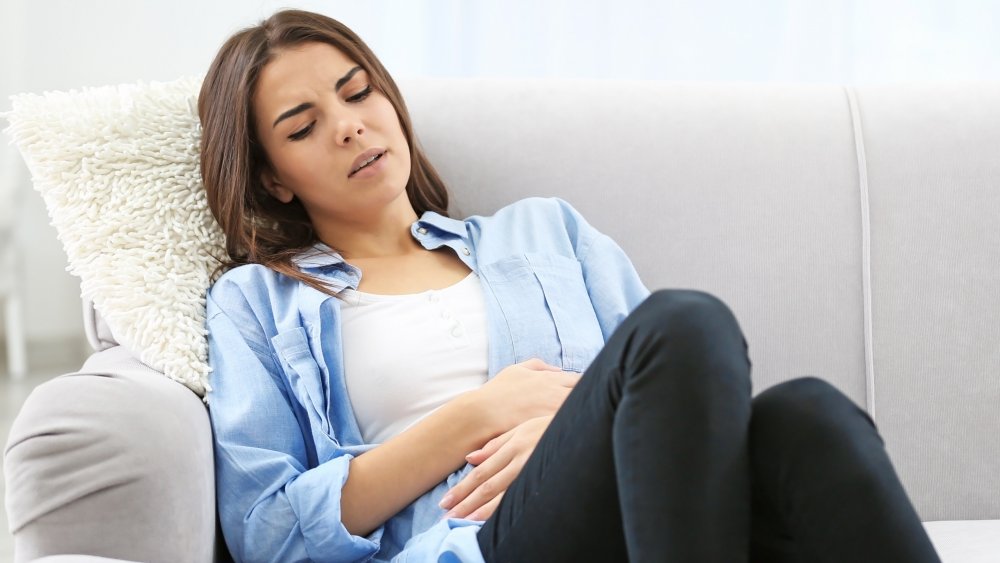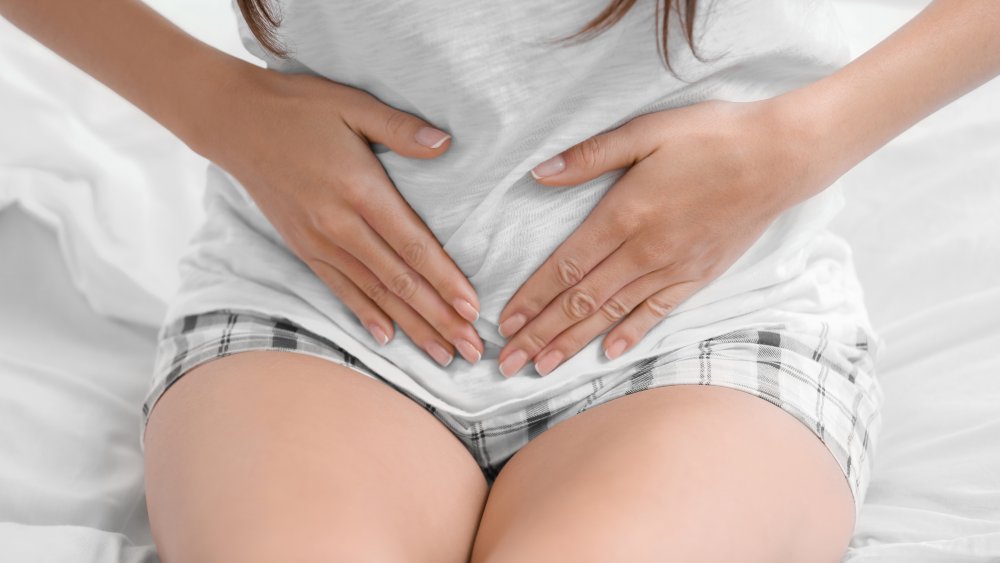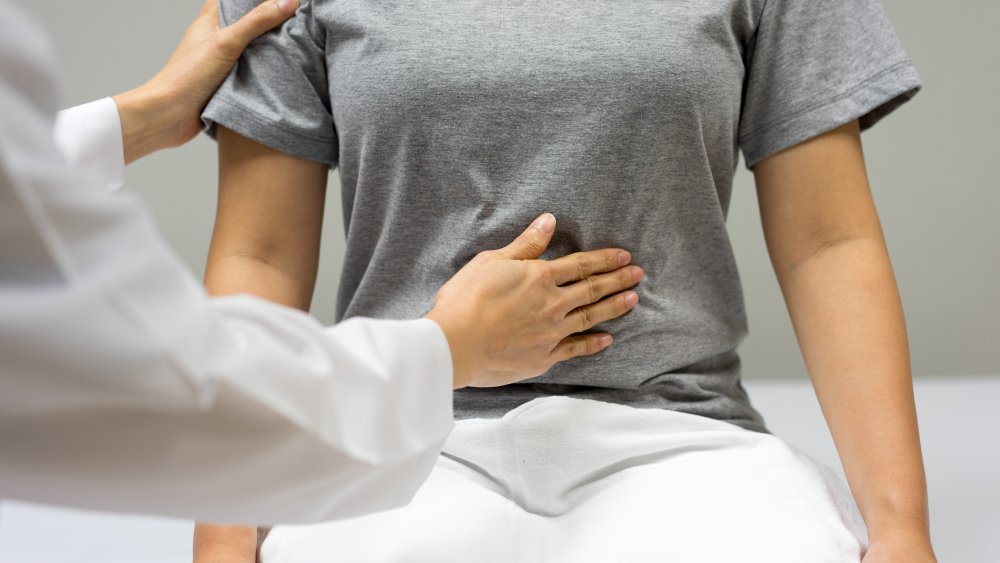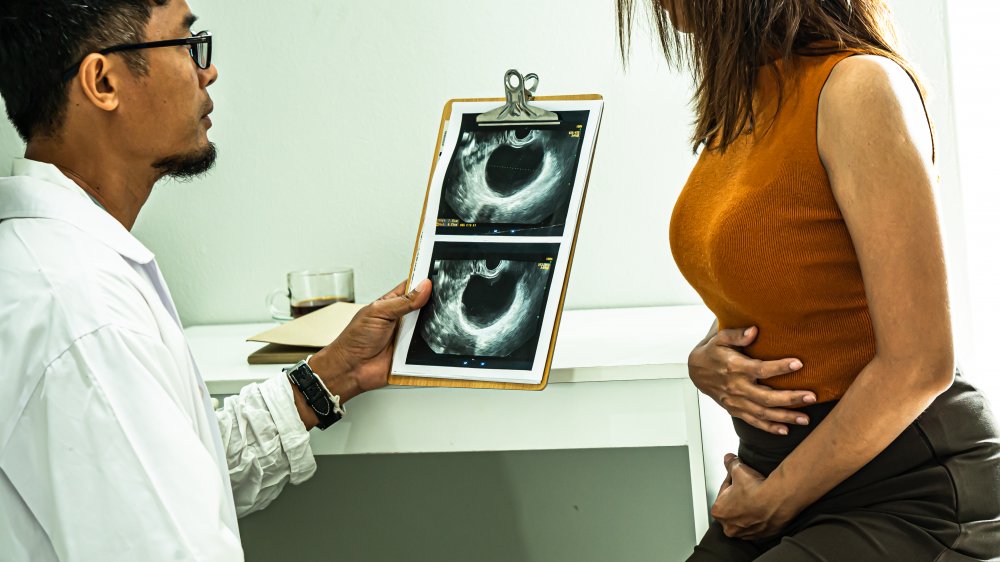When You Have Endometriosis, This Is What Happens To Your Body
Endometriosis is more common than you think. According to the Office on Women's Health, it is estimated that over "11% of American women between 15 and 44" have it. In other words, it's likely someone you know has it and you don't even know. In fact, they may not even know. As Professor Mark Baker, Director of the Centre for Guidelines at NICE told Women's Health, "Delayed diagnosis is a significant problem for many women with endometriosis leading them to years of unnecessary distress and suffering." He continued, "The condition is difficult to diagnose as symptoms vary and are often unspecific." So what exactly is endometriosis and what happens to your body if you have it? And more importantly, are there any telltale signs that indicate you might have it?
In simplest terms, endometriosis occurs when tissue, which is similar to the lining of the uterus, grows outside of the uterus (where it shouldn't be growing). As Dr. Narendra Pisal, consultant gynecologist at London Gynaecology, told Popsugar, there are three different types of endometriosis: superficial endometriosis, ovarian endometriosis, and deep infiltrating endometriosis. And they differ in severity.
There are three different types of endometriosis
Dr. Narendra Pisal explained (via Popsugar) the three types of disorder as: "Superficial endometriosis, which is mild endometriosis overlying the peritoneal surfaces (or, in layman's terms, the lining of the abdominal cavity); ovarian endometriosis, which leads to [the] formation of ovarian endometriomas (chocolate cysts); and deep infiltrating endometriosis," which "can involve the uterosacral ligaments (these lie behind the uterus and can sometimes be felt at the top of the vagina), the space between the rectum and the vagina (rectovaginal septum), or other organs such as the bladder, bowel, or ureter."
Symptoms of endometriosis to look out for include painful periods, painful sex, and painful bowel movements, along with bloatedness, gassiness, cramps, diarrhea, constipation, and even infertility (via The Seckin Endometriosis Center). You could also experience fatigue and aching. While some women with endometriosis may only experience one or two symptoms, others may experience a handful. Basically, there's rarely any consistency (which is why it's so hard to diagnose) but if you experience a couple of these symptoms often, it's worth seeking professional help.
It can be dangerous to leave endometriosis untreated
If you're experiencing these kinds of symptoms, it's crucial you act on them and talk to somebody, be it your parents, friends, or doctor — it's good to start somewhere. "The longer endometriosis is left untreated, the more it can influence the nerves and muscles of the pelvis, which can in turn lead to additional pain with certain movements and muscle spasm," Dr. Cara King, D.O., gynecological surgeon and associate professor at the University of Wisconsin–Madison, warned Shape.
To get an official diagnosis and treat it, "a doctor needs to perform laparoscopic surgery... and see endometrial tissue growing where it's not supposed to," Piraye Yurttas Beim, PhD, CEO and founder of the genetic testing startup Celmatix, told Well+Good. However, this can be invasive and painful so many recommend treatment with medication and/or hormone treatment to begin with. According to the American College of Obstetricians and Gynecologists, while surgery can help to reduce pain and improve fertility, approximately "40–80% of women have pain again within 2 years of surgery." If the pain becomes so severe it takes over your life, a hysterectomy may be a "last resort."
There is a serious lack of research surrounding endometriosis
In addition to medical treatment, changes to your diet and lifestyle have been proven to assist with managing mild symptoms. "Things that may increase inflammation in our bodies may increase the effects [of] endometriosis," women's health specialist Elizabeth Poynor, MD, told Well+Good. "Factors such as nutrition, environmental [toxin] exposures, or even how we handle stress could impact the way endometriosis affects the body, and thus the resulting pain that it causes," she added. Reproductive endocrinologist, Jessica Bauer, MD, agrees. "By adhering to a diet that supports an anti-inflammatory environment, instead of a pro-inflammatory environment, the discomfort and pain of endometriosis may be lessened," she told INSIDER.
Beyond this, there remains a significant lack of research regarding endometriosis and how to manage it. This rings true for diagnosis, treatment, and all other aspects of the condition, too. In fact, according to a 2019 study conducted by the BBC, women suffering from endometriosis reported having "suicidal thoughts, and many said they rely on highly addictive painkillers" just to cope with their symptoms. One of the best things to do we can do is to talk about it and do our best to raise awareness. And remember to keep asking questions.
If you or anyone you know is having suicidal thoughts, please call the National Suicide Prevention Lifeline at 1-800-273-TALK (8255).



